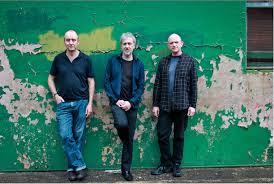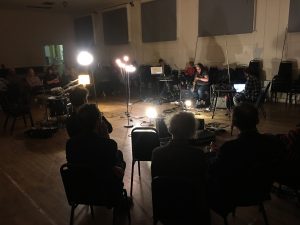History of Scottish Music Funding Part 2
April 4, 2018Nod Knowles was Head of Music at the SAC after Matthew Rooke and was in post from 1998 - 2005.
In this interview Nod discusses:
- How Scottish Arts Council (SAC) had become independent of Arts Council of Great Britain in the mid- 90s, and how that new independence was changed further by the devolution vote in 1997. So the cultural climate was changing, culture - except for media and broadcasting - was a devolved power AND an area where the new devolved government had real interest.
- How when he took over Traditional music was still only receiving funding via a Combined Arts budget and a small amount from the music budget, despite being very high quality and at the absolute centre of the musical identity of the country.
- How the muusic budget was still tied up with National Bodies and the status quo, of which well above 95% went to “classical" music, but how new Lottery money allowed new ideas to be tried and lanched - albeit within the "everyone and all art forms apply for the same pot with outcomes defined by access and public impact" culture that was the future for arts funding.
- How he "had the best of it" because while he was Head of Music, all the Heads of Artforms formed the bulk of senior management at SAC and so sat at the top table, had their own seperate budgets and were given a reasonable amount of of free reign to be strategic and fulfil a leadership role albeit within a set of clear constraints and targets.
- How he knew he was perceived as a “jazzer” initially and had to work to show that he was interested in all musical forms - which he was - and interested in "equity of opportunity' with a philosophy of "it's all music".
- How the Traditional scene had good leadership and moved from having various factions to recognising that a) they had a common interest in working together and b) that attacking classical music or opera for their funding levels wasn't a productive strategy.
- How the theory of what he wanted to do (ie of "equity of opportunity" ) and actually delivering it in practice were 2 very different things. So shifting the balance of where funding went had to be a slow process- starting with directing more towards Traditional music.
Nod cited as achievements he was proud of:
- Adding in rock/pop/indie as musical genrse that deserved to receive state funding.
- Setting up the What's Going Audit with Youth Music and the MU and it's role in stimulating the YMI. He also fills in some interesting stories on how the YMI was rolled out.
- Setting up Showcase Scotland - based on his experience of running similar events at the Bath Festival.
- Creating and runninhg the Tune-Up touring scheme
Areas of frustration for him were:
• How the jazz scene didn't have the same quality of leadership and many people tended to work in isolation.
• How at the end of his tenure he called a meeting of the Jazz sector which later became the SJF and the reasons why Jazz found it difficult to organise as a sector following the model of the Traditional Music Forum.
• He talked about the way funding organisations in the UK have gone - including SAC/Creative Scotland since he left - and how the trends in funding haven't been positive wrt 1) a move from specialism to generalism within funding bodies 2) the loss of Artforms having their own budgets and 3) How artform specialists are no longer in the top tier of management and 4) How funding agencies have retreated from a leadership role wrt looking at the needs of seperate artforms and genres - "we don't give out grants we receive applications", 5) How funding agencies have become less "arms length" and more prone to making knee-jerk reactions to the latest political directives 6) How the emphasis on spending more on grants than admin has made it harder for funders to spend time out in the field engaging with their sector.
• He talked about the justification for merging all the separate art form budgets being the accusation that art form departments were in "silos" and competing with each other - whereas he felt they worked better with their own budgets and strategies but also that the different art forms during his tenure worked well together in a collegiate way sharing their expertise.
Nod, like Matt, described his 7 years at the SAC as "one of the best times in my entire life" and talked several times on how the English Arts funding sector failed to learn lessons from pioneering work in Scotland.
History of Scottish Music Funding Part 1
April 3, 2018Matt Rooke was Head of Music from 1991-1997. In this interview he talks about:
- taking over from the Christie Duncan era, which lasted 25 years, in which music funding had been seen as primarily for building a 'classical' music sector and when 98% plus of funding went to 'classical' music when there was public debate about the similar audience figures for jazz, classical, and folk at that time.
- getting jazz, classical, and traditional musicians and organisations "in the same room" at a conference in Stirling in 1991 which was a precursor to starting to fund classical and traditional properly albeit in an era where overall music funding was increasing so he didn't have to cut too much to add in new stuff
- the hugely different life pathways and career and education options in Scotland at that time for someone who plays classical violin versus traditional violin and the role of the state in that
- the issue of national opera and classical orchestras beig seen as a badge of european statehood BUT that in Scotland these organisations weren't getting enough funding to do that job properly even when they were getting all the music funding. He mentioned Ireland deciding they couldn't afford a National Irish Ballet and just cutting it because it wasn't a national priority,
- How during his period in charge the move began to move the National Bodies (Scottish Opera, RSNO, SCO, etc) to direct funding and management by government - which he feels was a good thing and why - partly because it took up so much time.
- How during his period in charge there was a clear leadership role and strategy in shifting how arts funding was spent and a recognition og the value of specialist knowledge within the funders.
- He also says that the trends that became apparent later - 1) move from specialist to generalists within the finding agency and 2 ) retreat from a leadership role were already starting.
- How it was a soul - destroying job but one that he enjoyed and feels is one of the best things he ever did.
He felt his key achievements were:
- getting a much wider and fairer group of key players " in the room", starting to fund traditional music and jazz, Enterprise Music Scotland, increasing commissions and recordings funding, starting the move of National Bodies to direct management
His unfulfilled ambitions were around:
- making the recording side stronger, developing business training in the sector
India Trip Video Diary
March 18, 2018Thoughts on Wind Resistance by Karine Polwart
November 12, 2017PIE 7 moments
October 1, 2017Dolphin Boy & Playtime Trio 3
September 15, 2017At the Edinburgh International Jazz Festival at Soundhouse.org stage. July 2017. DJ Dolphin Boy on decks Graeme Stephen guitar Martin Kershaw saxophone Tom Bancroft drums filmed by Betty Boop
Dolphin Boy & Playtime Trio 2
At the Edinburgh International Jazz Festival at Soundhouse.org stage. July 2017. DJ Dolphin Boy on decks Graeme Stephen guitar Martin Kershaw saxophone Tom Bancroft drums filmed by Betty Boop
Dolphin Boy & Playtime Trio 1
At the Edinburgh International Jazz Festival at Soundhouse.org stage. July 2017. DJ Dolphin Boy on decks Graeme Stephen guitar Martin Kershaw saxophone Tom Bancroft drums filmed by Betty Boop
The Necks and the BBC SSO
May 8, 2017
When I have seen the Necks play they have always made me reconsider what music is and what it is for (both as a listener and a player) in a way that I have always found really cool, and I had that same experience this time but also with the symphony orchestra within that territory that is being redefined - it is redefining roles and expectations and demands on people (including audiences) and certainly orchestral musicians. It is fascinating to watch their body language and so many levels of meaning. And the bottom line was there were many moments where the orchestral element sounded really cool and to me it was a real sonic success. I saw Butch Morris doing his conducted improvisation with jazz musicians and really enjoyed it and I really enjoyed this too. That there will likely be very mixed opinions on it absolutely comes with the turf but for what it is worth that was mine!
http://www.bbc.co.uk/programmes/p05274dq
Nice video from last summer
April 3, 2017Nice video from the Edinburgh Jazz Festival Last year.
See longer full length video here.
Tom Bancroft presented one of our EXPO projects last year - here what he has to say about it...To see the full video, please visit: https://www.youtube.com/watch?v=IPNpPPmGeEE&feature=youtu.be
Posted by Edinburgh Jazz & Blues Festival on Monday, 3 April 2017
